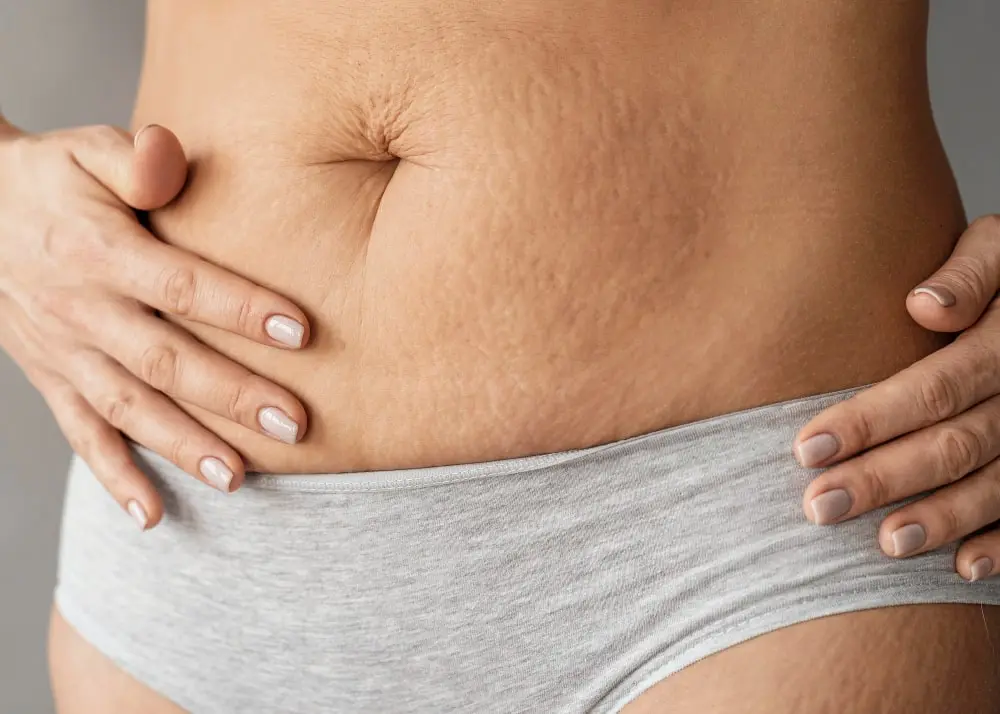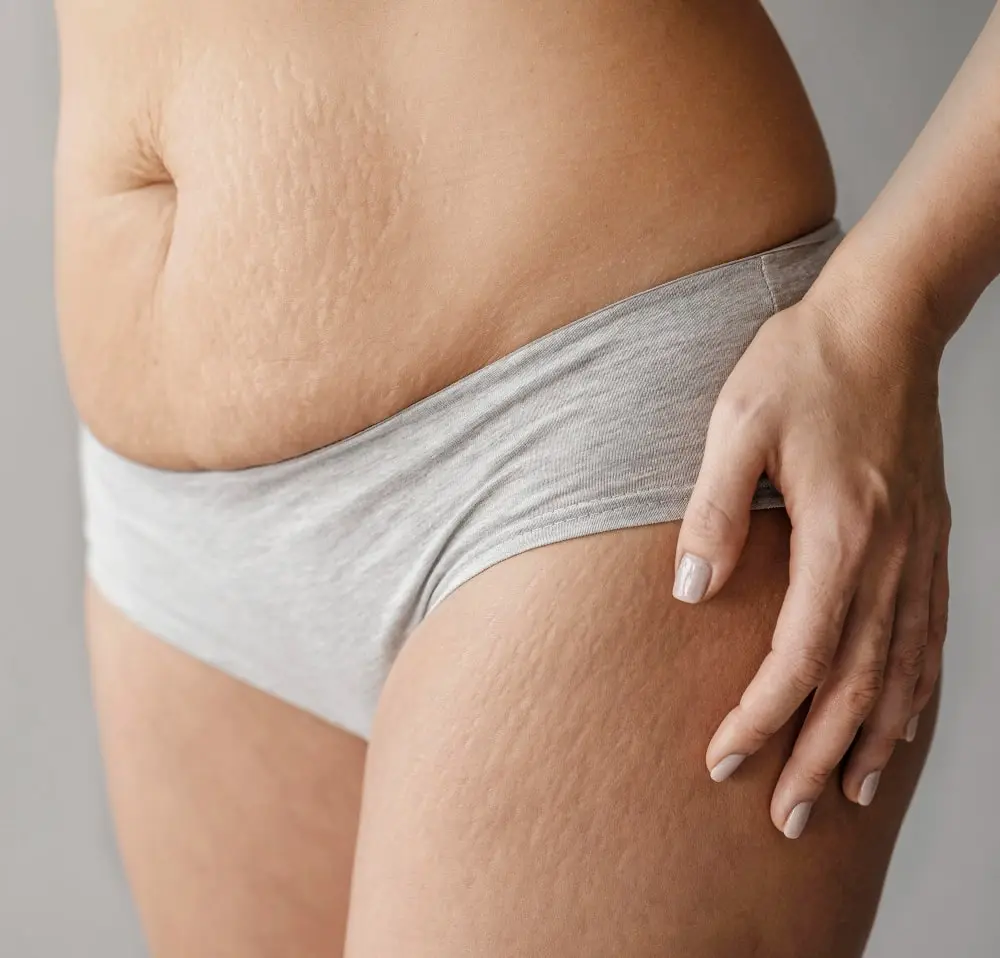Stretch marks are common for many individuals, particularly during life stages marked by rapid physical change—pregnancy, rapid weight fluctuations, or growth spurts. These thin, streak-like lines form on the skin due to stretching and are often harmless. Yet, one frequently overlooked aspect is the itchiness that can accompany stretch marks. This can leave many wondering: “Why are my stretch marks itchy?” You’re not alone if you’ve scratched your stretch marks or wondered if the sensation is normal. This article by Eve On 21 will explore the causes, remedies, and when to seek medical advice for itchy stretch marks.
What Are Stretch Marks?
Stretch marks, or striae, are scars that develop when the skin is stretched beyond its capacity. This stretching occurs due to the rapid expansion or shrinking of the skin, most commonly triggered by factors like pregnancy, puberty, rapid weight gain, and even rapid muscle growth. Stretch marks initially appear as reddish or purple streaks but can fade to white or silvery tones over time. Although they are a cosmetic issue, stretch marks can cause discomfort, particularly itching.
There are several types of stretch marks, and each appears slightly different:
- Striae Rubrae: Fresh stretch marks that are red or purple.
- Striae Albae: Older stretch marks that have faded to white or silver.
- Striae Gravidarum: Stretch marks linked explicitly to pregnancy.
But why do these stretch marks itch? To answer this question, we need to understand how the skin reacts to forming stretch marks.

Why Are My Stretch Marks Itchy?
When the skin stretches rapidly, it treats itchy stretch marks it doesn’t always have the elasticity to adjust comfortably, resulting in irritation. Below are some key reasons why stretch marks often cause an itchy sensation:
Skin Stretching
The outer layer is pulled taut as the skin stretches during growth spurts, weight changes, or pregnancy. This stretching and tearing disrupts the skin’s natural barrier, often leading to micro-tears in the skin’s structure. When the skin is compromised, it can become more sensitive to dryness and irritation, leading to persistent itching.
Healing Process
Stretch marks are essentially scars; like any scar, they go through a healing phase. During this time, the skin undergoes a tightening process that can cause a rash and uncomfortable sensations, including itchiness. The healing phase also triggers increased collagen production, further contributing to skin tension and itching.
Dry Skin
One of the most common reasons for itchy stretch marks is dry skin. As the skin stretches, it often loses its natural moisture and oils, resulting in flaky, irritated patches. Dry skin, especially in areas like the abdomen, thighs, or arms, can significantly contribute to the itchiness you may feel and the development of stretch marks.
Other Causes
While stretch marks can cause itching, it’s worth considering other factors that may exacerbate the sensation. For instance:
- Allergies to skincare products or materials in clothing.
- Skin conditions, like eczema, may flare up around the areas where stretch marks form.
- Infections can develop if scratching breaks the skin.
Remedies for Itchy Stretch Marks
If you’re dealing with itchy stretch marks, there are several remedies you can try to relieve the discomfort and help soothe your skin. Here are some of the most effective options:
Moisturising
Keeping the skin hydrated is one of the best ways to combat itching. Use rich moisturisers specifically designed to lock in moisture, such as products containing cocoa butter, shea butter, or coconut oil. These oils help restore the skin’s moisture barrier and reduce the irritation caused by dryness.
Home Remedies
Several natural remedies can alleviate the itchiness associated with stretch marks. Aloe vera gel, for instance, has soothing and anti-inflammatory properties that can calm irritated, stretch-marked skin. Coconut oil, known for its deeply hydrating and skin-repairing qualities, can also be massaged into the skin to relieve itchiness.
Over-the-Counter Products
If home remedies aren’t enough, many over-the-counter anti-itch creams are available. Hydrocortisone creams can help reduce inflammation and irritation, while calamine lotion may relieve cooling. However, using these sparingly is essential, especially on sensitive skin areas.
Avoid Scratching
As tempting as itchy skin can sometimes be, resist the urge to scratch your stretch marks. Scratching can damage the skin further, potentially leading to scarring or infection. Instead, use cold compresses or a cooling lotion to relieve the itch without causing more harm.
Gentle Exfoliation
Another helpful remedy is to exfoliate the skin gently. Exfoliation helps remove dead skin cells that could contribute to the itchiness. Opt for a mild, moisturising exfoliator to ensure you aren’t stripping your skin of its essential oils.
When Should You Seek Medical Help?
In most cases, itchiness from stretch marks is nothing to worry about. However, there are certain situations where it may be wise to consult a healthcare professional. You should seek medical attention if:
- The itching is severe or persistent, significantly if over-the-counter treatments don’t help.
- You notice signs of infection, such as redness, swelling, or pus.
- The affected area becomes highly red or inflamed, indicating a possible allergic reaction or skin condition.
- You have a history of eczema or dermatitis, which can worsen when stretch marks appear.
A dermatologist can provide specific treatments, such as prescription-strength anti-itch creams or medicated ointments to alleviate symptoms. Sometimes, they may recommend light therapy or other advanced treatments for particularly troublesome stretch marks.
How to Prevent Itchy Stretch Marks
Prevention is always better than cure, and while the stretch mark removal of marks may be inevitable for some, there are steps you can take to minimise the risk of itchiness:
Hydration
Drink plenty of water and apply topical lotions regularly to moisturise your skin. Products that contain hyaluronic acid, glycerin, or ceramides can also help your body retain moisture.
Healthy Diet
A balanced diet rich in vitamins like vitamin C, vitamin E, and zinc can help improve skin elasticity, making it more resilient and prone to stretching. Foods like berries, nuts, and leafy greens support collagen production, which can help reduce the formation of stretch marks and keep the skin supple.
Topical Products
Using stretch mark creams or oils during rapid skin changes (like pregnancy or puberty) can reduce the likelihood of dry skin and irritation. Look for products with retinoids (for non-pregnant individuals and women), Vitamin E, or Centella Asiatica, a plant-based extract known to improve skin elasticity.
Conclusion
Itchy stretch marks can be frustrating, but they are a common and treatable issue. The main culprits behind the itchiness fade stretch marks are skin stretching, dryness, and the natural healing process, all of which can make the skin feel tight and irritated. By staying on top of your skincare routine—incredibly moisturising regularly and using gentle remedies—you can reduce or even prevent the discomfort caused by itchy stretch marks. Radio-frequency skin tightening can also help lessen the visibility of stretch marks.
However, if the itch persists or worsens, seeking medical advice to rule out underlying skin conditions is essential. Taking good care of your skin helps ease itching and supports your skin’s ability to recover and thrive.
Ready to say goodbye to itchy stretch marks? Check out our recommended skincare solutions and get the relief you deserve. Book an appointment now!
Frequently Asked Questions(FAQs)
Can Stretch Marks Go Away If You Lose Weight?
Stretch marks from weight gain are permanent, even after losing the weight. However, newer red stretch marks can heal, while older translucent ones are harder to treat.
Can Stretch Marks Fade Away On Their Own?
Stretch marks will eventually disappear or become less noticeable, so you don’t necessarily need to treat them.
Are Stretch Marks Permanent?
Yes, stretch marks are permanent. However, they often fade and become less noticeable over time.
How Long Can Stretch Marks Last?
Stretch marks are permanent, but they fade over time. Initially red or dark, they lighten after several months to a few years. While they won’t completely disappear, proper skin care and treatments can help prevent them and reduce their appearance.
How To Stop Stretch Marks From Spreading?
Keep your skin well-moisturized with creams or oils that improve elasticity to stop stretch marks from spreading. Maintain a steady weight to avoid rapid stretching of the skin. Additionally, ensure a balanced diet with essential nutrients to support skin health.




